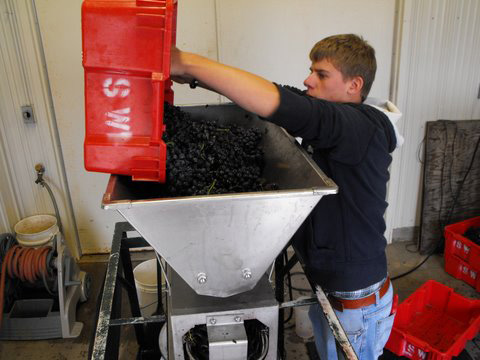The working wines of Michigan State University’s Spartan Cellars
Michigan State University’s Spartan Cellars produces and tests experimental wines as an integral part of evaluating new wine grape varieties and cultural practices for the growing Michigan wine industry.

You’ll never see an advertisement and or be able to buy them, but Spartan Cellars wines are true Michigan wines. As part of Michigan State University’s research and Extension work in the growing wine industry, Spartan Cellars makes the finished product to aid in evaluating experiments in the field. Assistant professor of horticulture Paolo Sabbatini supervises the planting, vineyard management practices, laboratory analyses and experimental winemaking.
Both undergraduate and graduate students are involved with making wines providing important learning experiences at Spartan Cellars.
Researchers are looking for differences in wine characteristics and quality between grapes grown in several experiments now underway. These include a national grape variety trial with two Michigan sites and comparison of different cultural practices such as canopy management (e.g. leaf pulling) and crop load.
Sabbatini believes that the successful expansion of wine grape production in Michigan will depend on the possibility to grow appropriate varieties that fit site characteristics. Therefore, variety recommendations are crucial and they are based on genetic performance tested in variety trials. A new variety trial for Michigan is under investigation under the responsibility of Sabbatini in association with the NE 1020 multi-state project entitled “Coordinated Wine Grape Variety Evaluations in the Eastern USA”. The objectives are, (1) evaluate the viticultural characteristics and wine quality potential of grape cultivars and clones of economic significance throughout the eastern USA, and, (2) characterize the viticultural and wine quality potential of emerging cultivars based on regional needs.
An illustration of the role of Spartan Cellars’ experimental wine-making came with a recent tasting of 20 wines produced from promising European grape varieties. The event was organized and coordinated by Sabbatini and Paul Jenkins, Michigan State Grape and Wine Integrator. From vineyards established in 2008 at MSU AgBioResearch sites in northwest and southwest Michigan, grapes were harvested and processed by winemaker Bill MacDonald using standard practices in small batches, or “microvinification”. Because of Spartan Cellars, Michigan growers, winemakers, and others provided invaluable feedback about wine grape varieties based on analytical data and experimental wines.
During the tasting of experimental wines, Sabbatini said, “We are living in a competitive and globalized grape and wine trade. The market is the driving force for quality/cost ratio of our vineyard operations and wine production. This is challenging for vineyard operators, grape growers and winemakers. The choice of grape variety and clones are, and will continue to be, pivotal factors to reconcile these difficult challenges. For this reason the Viticulture and Enology Research and Extension Program at Michigan State was really pleased to share with the Michigan industry their 2011 experimental wines, to evaluate new wines, promising winemaking techniques, and potential grape cultivars for Michigan.”



 Print
Print Email
Email